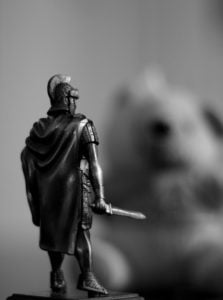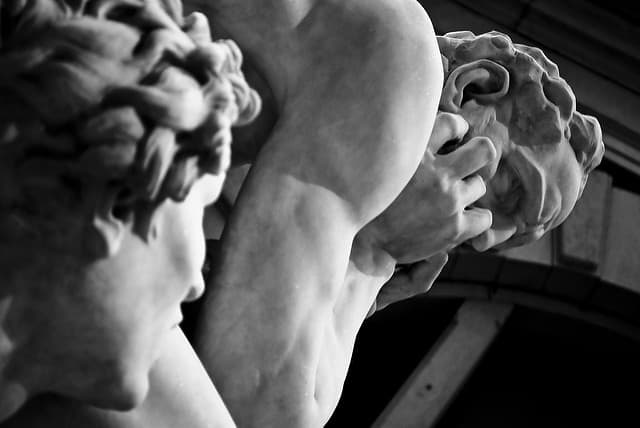I stood in the Jewish cemetery, Roman Collar tight around my neck, yarmulke resting unstably atop my head in the summer breeze. The sounds were tragic – the grind of a shovel hitting rock-filled dirt. The dull thud of that dirt hitting the top of a simple pinewood casket, muffled slightly by ceremonial cloth. The breathy sobs and restrained weeping of a girlfriend, a brother, his parents, his friends.
A 27-year-old man was murdered in Washington, DC. His name is Seth Rich. A man I knew from my time working at a Jesuit university. Seth was a man who, according to everyone, simply wanted to make the world better. He was shot and killed a block from his home early on a Sunday morning. When emergency vehicles got to his body, his phone, watch, and wallet were still with him. Was it a botched robbery? Something different, more sinister? Any suspects? No answers. Just questions for those who remain.
Seth was an employee of the Democratic National Committee. He worked to promote the most basic rights of all who participate in democracy in the US — the right to vote, and by voting, the right to elect the people who support our freedoms. The evening of his funeral, friends and coworkers in DC held a vigil near his home, lamenting his complete loss of freedom — freedom to work, to grab a few beers at the corner bar, to vote in the coming elections, to live. The DNC chairwoman spoke at the vigil. Even Hillary Clinton, now the Democratic Party’s Presidential nominee, mentioned Rich in a speech calling for limits on the proliferation of guns. Seth’s death might push some cause or another forward, but it does little to comfort those who remain.
* * *
Ronald Reagan said once, “Freedom is never more than one generation away from extinction. We didn’t pass it to our children in the bloodstream. It must be fought for, protected, and handed on for them to do the same, or one day we will spend our sunset years telling our children and our children’s children what it was once like in the United States where men were free.”
I wonder whether the freedom Reagan spoke of may already be extinct. I wonder whether it ever existed at all.
In recent weeks, from Orlando to Nice and Baghdad to Rouen, many have needlessly died – people of many colors, nations, genders, sexualities, faiths, and professions. These people are no longer free, at least not in Reagan’s sense of the word. Their blood has been spilled, and their bodies rest in tombs, slowly fusing with the earth again. Life, as the world knows it, has escaped them. They won’t enjoy ice cream on hot summer days anymore. They won’t struggle to perfect double windsor knots in their uniform-issue ties. They won’t dance in kitchens or living rooms or night clubs, attend street carnivals, or sing along to their favorite songs. They won’t go to their churches, mosques, and synagogues to find a sliver of peace from the world of violence swirling around them.
* * *
It’s one thing to read stories of murder on the news. We hear these stories every day, and we have for a long time. It’s another thing entirely to see video footage of someone dying, regardless of the circumstances, or to stand before a casket holding the lifeless body of a man ravaged by bullets. In watching “graphic violence” videos online and in attending Seth’s funeral, I find myself feeling nauseous. Nauseous that we kill each other constantly. All, apparently, for freedom. All in fear of what might be taken from us if that freedom is compromised. Yet, I feel called to face these videos and his body and the death all around me. I’m compelled not to turn away, no matter how graphic or sad or challenging the content might be. To let these realities cut more deeply into my mind and heart. To see Seth’s casket and remember that whatever freedoms the living may desire don’t exist for him anymore.
Freedom, as Reagan understood it, requires us to live on this earth with air in our lungs and liquid pumping through the chambers of our hearts. This is a cheery idea — especially in this season of political stump speeches — but I’m not particularly concerned about this kind of freedom.
There’s another kind of freedom I’m ultimately seeking, a kind that is found in the way I have been made. It runs through me — body, mind, and soul. It is a kind of freedom that lasts even after I die. It is a freedom that comes from surrender, from sacrifice, from acknowledging that my life is not entirely my own, and that something far greater than me is at work within me.
* * *
I believe in God and in eternal life. Which is to say that I don’t really believe in death after all.
Before the cemetery, Seth’s friends and family gathered in his sacred space, and these words fell upon those gathered, both sobering and comforting: “The Lord is my shepherd. I lack nothing…beside quiet waters God refreshes my soul…I shall dwell in the house of the Lord forever.” We weren’t there to lament Seth’s loss of freedom in this life – we were there to remember that he is now free forever with God.
The freedom God provides will never go extinct. So, then, why would I place my trust in a form of freedom that doesn’t last when I’m gone? I’ve come to believe that seeking spiritual freedom requires that I let go of other freedoms. Freedoms that make it easier to get up in the morning and think that this is all there is – a life which holds the fallacy of endless choice and opportunity, safety and security, pride and patriotism. It’s all nestled in deep-seated fear of the danger and violence that we cause. These freedoms which I think I control are no replacement for God, who actually grants me the capacity to live and love freely.
Daily, I pray these words: Take Lord, receive my liberty. Liberty – the state of being free, of doing what one pleases without facing oppression from authority. As an American, it strikes me as strange that I would pray to God to take and receive this liberty – the very thing that allows me to proclaim that I am free.
 But maybe words like “liberty” and “freedom” confuse more than they clarify. Because these “freedoms” have the potential to pit human lives against each other: freedom to carry a gun, freedom to isolate myself from people who are different from me, freedom to live in economic security while others swelter in the heat of poverty and oppression… These freedoms allow me to preserve myself at the expense of other lives. It’s me or them. Not us.
But maybe words like “liberty” and “freedom” confuse more than they clarify. Because these “freedoms” have the potential to pit human lives against each other: freedom to carry a gun, freedom to isolate myself from people who are different from me, freedom to live in economic security while others swelter in the heat of poverty and oppression… These freedoms allow me to preserve myself at the expense of other lives. It’s me or them. Not us.
But spiritual freedom has nothing to do with defensiveness or bullets or fear. It has to do with surrender. It has to do with forgiveness. It has to do with sacrifice, perhaps the ultimate sacrifice. Others have witnessed to this freedom: to wit, King, Ghandi, Romero and other Salvadoran martyrs…and of course Jesus, a humble Galilean who would otherwise be forgotten.
It isn’t that I must die, but that I am willing to. It isn’t that I desire to be a martyr, but that I desire to do God’s will. Yet…I’ll admit. I’m not yet ready to give up my own body or my own breath to help perpetuate this kind of freedom. I’m not yet fully ready to use my own body as a shield or to die – I imagine that in those moments, it will be hard to believe that death isn’t real. I prefer quiet waters and green pastures to raging anger and blood-soaked streets. I can only hope for the courage to seek God’s will in the world, a will that demands that we not kill each other. If the moment comes when my earthly life ends sooner than expected — as it did for the mild-mannered elderly French priest Jacques Hamel during a morning Mass last week — I hope to remember that “death” will not be the end of anything. Even if someone forces me to my knees and robs me of my earthly freedom, I hope to continue on the pathway to God.
I want to be ready. I want to help show what God has revealed. That in loving one another, we may find peace now and forever. That in facing the violence of men, we remember that it doesn’t have to be this way. That in seeing a lifeless body hang from the cross of our time, we remember that the body comes down and is remade. And so I pray: Take Lord, receive.
–//–
Title image, “Fear” by Wagner T. Cassimiro, is available on Flickr here.
“Fearless” by Flickr user M.G. Kafkas, is available here.


